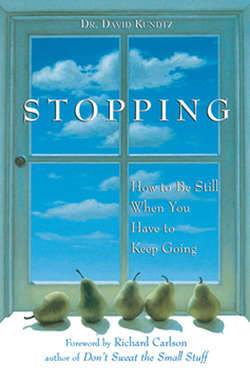Читать книгу Stopping - David Kundtz - Страница 17
На сайте Литреса книга снята с продажи.
ОглавлениеBeyond living and dreamingthere is something more important:waking up.
ANTONIO MACHADO Times Alone (Translated by Robert Bly)
10
Stopped: Awake and Remembering
Picture a lone traveler on a journey, paused at a fork in the road, considering the moment, fully awake, poised, not rushed, aware of his or her power, and, only when the time is right, choosing the road and continuing the journey. A decision thus made cannot be wrong. The journey will be successful, whatever its outcome. The pilgrim is awake and recalls the answers to the important questions of life.
Now imagine another traveler stumbling down the road, frantic with anxiety, unfocused, dropping things along the way, unable to distinguish accurate directions from false ones, tattered, exhausted and, without thought, taking the fork in the road that's the closest. Not an appealing model nor one we would choose to imitate. Yet most of us do. Racing from thing to thing or from note to note, in a frantic attempt to keep up or to catch up, we lose our keys, our plane ticket, our date book, ourselves.
Here is an example from my college years: It was at Georgetown University, 1955. So taken up was I with the shouts of “revolt!” that I walked boldly out of class one day with hundreds of freshmen, practically our entire class. I have now forgotten what the intended revolt was about, some perceived inequality no doubt, but we were clearly serious. We had organized the revolt, kept it secret, and then screamed it to the world as we marched onto the football field, daring university officialdom to oppose us.
Then Joe Rock appeared out of nowhere. He was a 250-pound Jesuit priest—most of it belly—with a snarl calculated to induce terror and immediate submission into the heart of any faint-hearted freshman. He lectured us for fifteen minutes with studied gesticulations and barely controlled roars. I can still hear his voice: “There will be no revolt! I'll give you three reasons why there will be no revolt!” Joe Rock always had three reasons for everything even though we were convinced he was thinking up the second and third as he was expounding the first. It was during his “three-reason” lecture that I remembered something: I am not a revolutionary, don't really want to be a revolutionary, and would make a lousy revolutionary.
I had hit the ground running, I had begun this revolt without being awake or mindful. In no way was I Stopped. Neither, it seemed, were my cohorts. We were simply caught up in the heat of the moment. So Joe Rock's posturing easily worked. In fact, I was thinking during his lecture, “He's right, this is silly, this makes no sense at all. . . .” Some revolutionary.
Being awake—knowing who you are—and paying attention to what is going on both inside and outside of you, is close to what the Eastern spiritual traditions call mindfulness. It involves being very present to this moment, to what you are now doing, to this feeling, and to this person in front of you. It is what newspaper columnist Adair Lara means when she relays the story of what her mother wanted on her birthday, “presence not presents.” It is noticing the tone of someone's voice and their body language, as well as noticing those things in yourself. It is seeing the many things that occur in your day and quickly establishing whether they are important or trivial. It is tuning in to other people and yourself. Being awake is a very in-the-moment act; an act of right now. It is the opposite of being distracted and unfocused.
Stopping brings you awake and aware of the present moment. But it also helps you bring together the threads of your history, of your stories. It helps you to remember who you are, where you come from, where you are going, and where you want to go; to remember your original goals, ideals, and dreams; and to remember why you started doing what you do so that you can see if that's still what you want to do. Even if you have no clear answers for many of the big questions of life, it is vital to continue to remember what your questions are. Losing your questions is truly losing your way.
Stopping is also remembering in a more literal sense: remembering. That is, to collect again all the parts of you that have been left behind or scattered about in your hurry and to get all your “members” back again into a cohesive whole. The poet Robert Bly speaks of the “bag we drag behind us” as full of those parts that we have lost the use of—our innocence, our spontaneity, or our playfulness. Stopping is reclaiming those parts we did not want to lose, the parts that were stuffed in the bag, maybe years ago, and are hidden and forgotten.
These two gems, awake and remembering, are the essential elements of Stopping.
